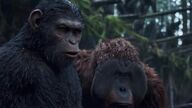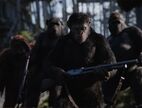The following film review contains minor spoilers and does not affect the viewing of the film.
Few series of movies have made Da Cong wait so anxiously. I am afraid that in addition to the "Alien" prequel series and the "Star Wars" series, the rest is the "Rise of the Planet of the Apes" series.
The final chapter of "Rise of the Planet of the Apes 3" ignited on July 13, revealing the final question of survival between humans and apes (the release date has not yet been determined in China).
Everyone should have heard that the reputation of the first two "Rise of the Planet of the Apes 1 and 2" is quite optimistic.
The release of the final chapter of "Rise of the Planet of the Apes 3", the pursuit of victory, is the perfect ending to this series. (Of course, there will be a sequel or a spinoff.)
From the current point of view, the third word-of-mouth box office is showing a blowout trend.
"Rise of the Planet of the Apes 3" describes the 15 years after the outbreak of the first "Ape Flu", the war between the orangutans has entered the final decisive moment.
Starting from the second part, due to the outbreak of the virus, human beings have become a situation in which there are more apes than humans. In the third part, apes still have the advantage in number, and several new characters have been added to the film.
One of the more important is the newly debuted "Bad Gorilla".
It stands to reason that the awakened orangutans are all because Caesar put the gas into the smart orangutans, and then through the breeding of more smart orangutans, in this big family of apes, they can sign language with each other, which is a new group of orangutans.
The "bad orangutan", who can't sign language, is a smart orangutan that has naturally mutated during the catastrophe of more than ten years. Familiar with human routines and speak fluent English.
This is a strong point of information given by the movie. Orangutans in nature can be awakened by natural mutation. Although the bad ape in the film mentioned that he was the only one who survived, I believe this is a clue left by the movie.
(Bad Gorilla character introduction clip)
Another important new character is the little girl who exists in both the poster and the trailer, and it's clear that the little girl was adopted by an orangutan. And this little girl is the only one immune to the virus, she's a rising star.
(Little girl debut clip)
Perhaps, if there is a sequel, she may be another branch of the future of mankind.
In the human base camp, there is an additional major, a typical villain, who slaughtered and enslaved apes. Ignite the ultimate fuse of human existence.
The overall feeling of the movie that Da Cong watched:
Reasonable, expected. It is an excellent commercial film worth recommending.
Especially in the small-scale battle at the beginning of the movie, it instantly ignited Da Satoshi's adrenaline.
At the beginning of "Rise of the Planet of the Apes 3", the director used a lot of God's perspective to describe a battle between orangutans. Well framed background era of the epic turn of the apes.
The conflict between the orangutans burned the first 30 minutes of the film.
At this point, Da Cong has been brought to the emotional boiling point by the movie!
But, here comes the turning point.
After 30-40 minutes of the film, the plot of the film seems to have a lesion.
The pattern of the film is instantly pulled away from the big background of the epic of the ape, like a deflated balloon, and turned into a very small- scale plot story.
Moreover, the rhythm of the storytelling has slowed down significantly, and there is even one or two scenes, which makes people feel procrastinated.
But fortunately, the director's control is still in place, although the layout has become smaller, and the rhythm of the plot of each scene has slowed down.
This instead makes the image of the protagonist Caesar more three-dimensional, but to be honest, the first two films have established the image of Caesar from birth to the present, and there is no need to use the third final chapter to continue to spend a lot of time building Caesar's heart. tangled.
But from another point of understanding, if the "Planet of the Apes" center of gravity trilogy, not in the context of the Apes future; instead focuses on Caesar's life, then the "Planet of the Apes 3" to the story of this architecture, It is also understandable.
Just like the title "Rise of the Planet of the Apes", the entire series tells the story of the rise of the apes, but this story is a bitter history.
If the audience wants to see various blasting war scenes, they may be a little disappointed, because of the bitter history, it is difficult to see the magnificent battle scenes of the human and apes.
But it will be interesting to analyze this final battle in depth and why the whole movie is ape and human, and it will be very interesting to be able to get to such a situation step by step.
If the entire trilogy is considered together, this final battle is an accident and an inevitable one.
The future survival of orangutans, from the first part to the end of the final chapter, is accidental and inevitable.
Therefore, thinking in a more far-reaching direction, the "Rise of the Planet of the Apes" trilogy explores a hypothesis about the future destiny of mankind.
Just like human beings and artificial intelligence, it is an enduring theme of science fiction movies, because this common theme contains thinking about where human beings will go in the future.
The human-ape war is actually similar to the human-intellectual theme, but with a sci-fi coat to interpret the survival and death thinking of humans and other species.
When it comes to the theme between orangutans, we have to re-acquaint ourselves with the grandfather of the ape topic: Pierre Bühler.
He published the novel Planet of the Apes in 1963, which was successfully adapted into the film Planet of the Apes in 1968.
The movie, like the novel, tells the story of a human spaceship that fell on a planet ruled by apes, and then humans discovered that the planet turned out to be the earth after experiencing various encounters with apes.
After the film was released, it opened the door to the themes of orangutan science fiction. Since then, there have been four consecutive sequels to Planet of the Apes.
Although the Chinese titles of these films vary, the overall English title of the series is "the planet of the apes".
The Chinese names are "Planet of the Apes", "Lost in the Planet of the Apes", "Escape from the Planet of the Apes", "Conquer the Planet of the Apes", and "Fight the Planet of the Apes".
If you want to know what you said, Da Cong has sorted it out for you.
These five films together tell the story of human beings falling on the Planet of the Apes and discovering that the Planet of the Apes is actually the earth after 2000, and then relying on a kind-hearted ape couple, time and space travel back to the earth ruled by humans at that time.
The ape couple was unable to return to the future on the earth ruled by humans, and gave birth to the little ape, Caesar.
But human beings know that in the future the earth will be ruled by apes. So the ape couple was killed, and Caesar survived.
The virus from outer space made the apes smart, so the apes began to unite against humans, and finally the apes led by Caesar fought the final battle against humans.
If we say that these five parts are really far away from everyone. Then the "Planet of the Apes" restarted in 2001 should not be too unfamiliar, and the director is still the flamboyant Tim Burton .
It's a pity that this movie is more of a remake than a reboot. Although the box office is good, the script has hardly changed. So much so that it was rated as nothing new, and the film company was left alone.
Until 2011, the "Rise of the Planet of the Apes" series, based on the previous five parts, carried out a restart of the theme, and this restart adapted a large number of story backgrounds, making the story closer to modern values, and moving the universe through science fiction, etc. Elements are removed, and chance events are used to expand into a swan song of epic conflict between orangutans.
Therefore, if you really want to make up the class, you only need to complete the "Rise of the Planet of the Apes" in 2011 and "Rise of the Planet of the Apes 2" in 2014.
If you still don't have time for tuition, it's okay, Da Cong will continue to help you sort out.
The protagonist of "Rise of the Planet of the Apes 1" is a researcher in a biological laboratory. To study the treatment of Alzheimer's disease (senile dementia), the subjects of the experiment, of course, started from the close relatives of human beings - orangutans.
Therefore, from the beginning of the film, the first original sin of human beings was derived, and the orangutan was used as an experiment.
Humans experimented again and again, and finally got results. The protagonist boldly changed the experimental subject to a father suffering from Alzheimer's disease. At first the healing effect was remarkable, but the experiment ended in failure.
But the orangutan was awakened by the experimental drug and began to awaken the call in his heart. That is, "Who am I?".
The representative of the orangutan's awakening is named "Caesar".
Caesar's mother gave birth to him after being used as an experimental subject, so Caesar's body was shed by the blood of awakening from the drug.
And the young Caesar was adopted by the kind-hearted protagonist because of his mother's departure. The protagonist's education of Caesar made Caesar's awakening speed develop rapidly.
When Caesar was a teenager, he, like a human, began to enter a period of youthful rebelliousness, and Caesar's rebelliousness was the answer to "seeking oneself".
For example, in the film, Caesar turns to ask: Am I your pet?
During the rebellious period, Caesar began to make troubles and gradually became estranged from his owner. In the end, Caesar could only be sent to the "Animal Control Center".
Caesar, who was abused in the control center, began to think about another problem - "independence".
So that in the end the protagonist came to take Caesar home, and Caesar was willing to stay in the control center in order to plan an uprising to fight for independence.
It was at this time that the story changed qualitatively. Caesar stole a large amount of drugs that could awaken orangutans from the protagonist's house and put them in the animal control center.
The fire of the orangutan can start a prairie fire, this is the first step. The orangutan in the animal center also began to wake up because of the drug.
Under the leadership of Caesar, the orangutans in the animal control center managed to escape from the animal control center, and then went to destroy the control room where the orangutans were used for experiments. More Awakened Orangutans are released.
Among them is the orangutan "Kuba" who has suffered a painful experience of abuse. It is the second-in-command of the orangutan.
With such a big movement, human beings will of course carry out a massacre counterattack.
So the first small-scale battle between orangutans and humans began.
And because humans were caught off guard by this awakening of the orangutan, and humans underestimated the orangutan, it ended with the orangutan winning the first game.
In the end, the orangutan escaped into the big forest, declaring that the orangutan group centered on "Caesar" realized the third jump "freedom".
That's right, the first "Rise of the Planet of the Apes" is not aggressive, epic, or grand. The main and delicate description of Caesar's awakening trilogy, namely "seeking self", "independence", "freedom".
It seems that the occurrence of a series of events is accidental, but there must be an inevitable key hidden in the accident.
For example, sooner or later, human beings will take risks to study experimental drugs that are beneficial to human beings, and human beings do not actually understand the risk factor of such drugs.
For another example, on the surface, Caesar was abused by the administrator of the control center, causing Caesar to pursue independence.
But in fact, with the passage of time, Caesar will one day choose to leave the protagonist, leave "home", leave the human world, and create an independent and free home for the orangutan.
In fact, it would be a piece of cake if human beings were once again ready to go and concentrate their firepower and technology to encircle and suppress this wave of awakened orangutans.
But "Rise of the Planet of the Apes 2" did not follow this routine, but set the story background of the second part in a few simple sentences:
Because of the drug incident in the laboratory, the "simian flu" was caused. In eight years, 90% of human beings have died, and no drugs that can immunize have been found, government agencies have been shut down, and people's livelihood services have been terminated.
And apes reproduce in large numbers, and the ruler of the earth may no longer be human.
Humanity's own destiny is bleak.
Caesar had his own family at this time, leading a group of orangutans who hunted for a living, and did not want any contact and conflict with humans. After all, "Caesar" was once adopted by humans. He knew a little about the technological level of human beings, and his emotions were also very complicated.
But after all, humans came uninvited and disturbed the orangutan population.
Caesar, who advocates peace, released his good intentions to let humans build dams on the orangutan territory, provided that humans do not carry weapons.
But human beings are human beings after all, "doubt", these two words flow in the bone marrow of human beings. Humans betrayed the apes, carried weapons privately, and were caught by Caesar.
Caesar's attitude toward humanity, once again, went from trusting to skeptical.
But this incident was not the weight that affected Caesar's final inner sway, causing Caesar's greater inner unease. It was the Kuba of the orangutan group.
After the dam incident, the relationship between humans and the orangutan family was finally broken, and Kuba even fanned the flames behind, and even rebelled and rebelled, playing the dark trick of human beings and assassinating Caesar. and blame it on humans.
In this regard, the armed conflict between humans and the orangutan tribe started again.
Caesar thought it was a human thing to doubt each other and kill each other. The orangutan group should be one heart, one family.
In the end, Caesar discovered that, like humans, orangutans actually have betrayal, suspicion, and all the shortcomings that humans have.
What made Caesar even more desperate was that he naively believed that he could prevent a larger conflict between humans and apes.
But in fact, from the moment Kuba led the orangutan to attack humans, the war between orangutans has become irreversible.
A decisive battle is about to unfold.
The fate of humans and apes on Earth. It was left to the third final chapter: "Rise of the Planet of the Apes 3".
Although the tune of the current series of movies is all about the structure of various movie universes. The "Rise of the Planet of the Apes" series of trilogy adheres to the traditional trilogy route. For now, "Rise of the Planet of the Apes 3" is the final chapter. It's also an end to it.
I just don't know if the "Rise of the Planet of the Apes" series can hold its ground. Don't make "Rise of the Planet of the Apes 4" because of the soaring box office of word of mouth.
If there is such a day, it will not be Caesar's world.
Welcome to continue to pay attention and bring in-depth spoiler analysis in a few days.
Pay attention to "Da Cong Watching Movies", do not pursue the running volume, only grind the fine products
For more popular movie reviews, please jump to the gate of time and space:
"Wolf Warrior 2" is cool, let me criticize it calmly.
"Interstellar Agent" 180,000 per second! What are you showing us? !
Value for money or great value for money? "Dunkirk" 20,000 words in-depth analysis
"The Seven Deadly Sins" in "The Legend of Wukong"
Why is this the best Spider-Man movie ever made?
Optimus Prime "misidentified his hometown", what secrets are buried in Transformers 5?
"Despicable Me 3": I still miss the bad moon thief
Doing the right thing is far more far-reaching than doing it right--thinking about the alien prequel series
View more about War for the Planet of the Apes reviews











